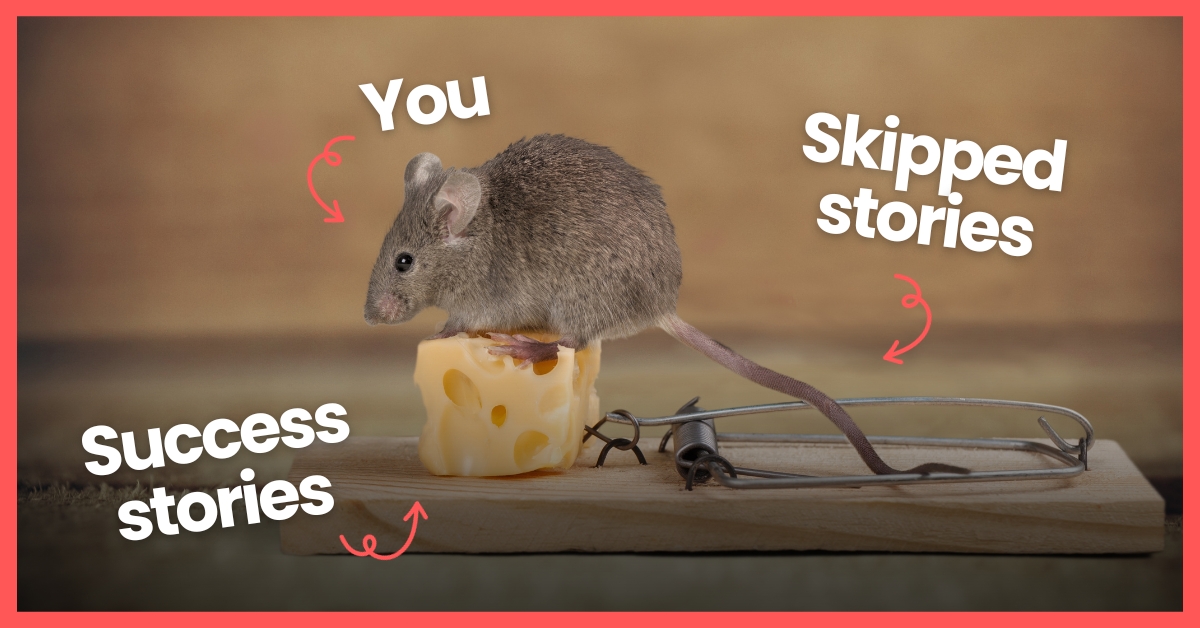Do You only learn from business success stories?
If yes, then You should get to know about a phenomenon called “survivorship bias”.
“Survivorship bias” is a cognitive mistake that could push You to make the wrong business decisions.
It's like looking at success stories without paying attention to the failures.
This is a trap of our mind.
We focus only on the “survivors” and neglect those who didn't make it or were left behind.
This bias confuses our judgment.
It makes our conclusions flawed.
Because You may miss crucial lessons from those who faced failures.
It's a way for You to see the bigger picture for smarter analysis and decisions.
Let me give You a few examples.
Example No. 1
For instance:
“Steve Jobs dropped out of college and became a millionaire.
Therefore, the secret to success is leaving university and dedicating all Your time to Your idea.”
In reality, this doesn’t hold true, and billionaires without higher education are less common than it seems.
Among the 362 wealthiest people in the USA, only 12.2% dropped out of college.
Example No. 2
Another example in the business sphere is the survivorship bias in entrepreneurial advice.
People often hear stories of successful entrepreneurs who took unconventional paths or made bold decisions.
They may conclude that these strategies are foolproof and universally applicable.
However, the stories rarely mention those who took similar risks and failed.
As a result, novice entrepreneurs adopt strategies that worked for the survivors.
The trap here is to do this without understanding the broader context, leading to misguided decisions.
Example No. 3
Now, consider this striking example.
It’s not from the business world.
But I really like it because it shows how impactful the “survivorship bias” can be in our lives.
Abraham Wald was a mathematician working in statistics during World War II.
He was researching how to improve the armor of military airplanes.
Curiously,
He focused not on the areas where the planes were damaged but on those where there was no damage.
His conclusion was as follows:
If planes returned undamaged in certain areas, those were the areas that needed to be reinforced with armor.
Why?
Because the planes damaged in other areas did not return, and their damage was not considered.
In this way,
Abraham Wald avoided the survivorship bias by considering not only the surviving planes but also those that were lost.
I hope this powerful example has given You a sudden moment of clarity.
How Do You Prevent Becoming a Casualty of Survivorship Bias?
Let me give You a few pointers and ideas.
Tip No. 1
Just knowing about the survivorship bias makes it easier for You to sidestep this cognitive pitfall.
Furthermore, evading the consequences of this bias is possible by critically approaching decision-making.
Tip No. 2
Consider any success story as just one possible outcome, not an ultimate truth.
Look for unsuccessful statistics or failure stories and see what went wrong.
Tip No. 3
Don't rely on superficial judgments and hasty conclusions.
Make sure You have enough information to make a decision.
Ask Yourself the right questions:
• How do I know this?
• Is all the information on the topic?
• What data supports this version/hypothesis?
• Under what conditions were the data collected?
• Can I distinguish facts from subjective opinions and impressions?
• Does the available information paint a complete picture or just a part of it?
Follow my blog for more business and marketing content.
P.S. Warning: “Red pill” vibe only.
